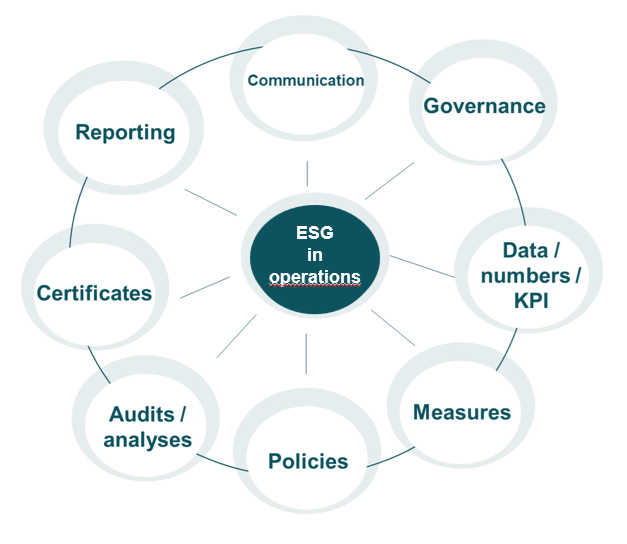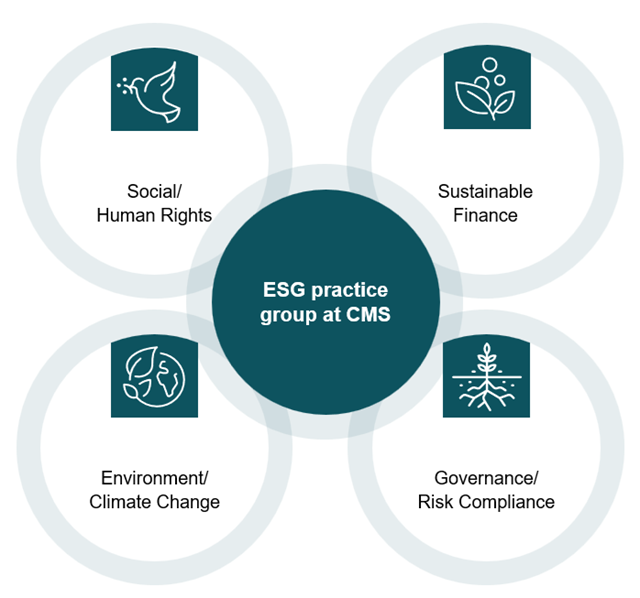Structuring sustainable business practices in a legally compliant manner
Sustainability strategy and ESG compliance
ESG is not a purely legal issue, it also poses many challenges in terms of corporate organisation and development. Our lawyers advising on ESG compliance fully understand these additional aspects.
A selection of operational topics relating to ESG compliance
The combination of legal excellence, compliance expertise and specialist ESG knowledge has proved its worth for our clients
Experts are available in all legal areas to advise you on ESG issues, the juridification of sustainable business practices and on legal implementation of your sustainability requirements and strategy.
We advise companies across all industries and sectors and every legal form, developing customised solutions to meet their needs. Our ESG compliance service portfolio:
- Advice on structuring options, especially with regard to compliance management systems and risk management, and also on the development and implementation of compliance structures that incorporate ESG aspects
- Conducting ESG risk analysis and materiality analysis or supporting such analyses
- Developing an ESG strategy
- Monitoring regulatory changes at national and international level
- Advice on implementing the relevant special statutory provisions, including supply chain compliance (Supply Chain Due Diligence Act (Lieferkettensorgfaltspflichtengesetz – LkSG) and in future the European Corporate Sustainability Due Diligence Directive (CS3D)); advice on the Whistleblower Protection Act, on implementing the appropriate measures and on preparing the necessary documentation; and advice on the Corporate Sustainability Reporting Directive (CSRD)
- Developing and enhancing internal mechanisms (guidelines, policies, operational instructions and processes) with regard to the ESG aspects that are important to the specific company
- Developing and implementing training programmes for managers and staff
- Advice on developing a long-term stakeholder engagement plan as the basis for ESG compliance
- Preparation and support for EcoVadis audits or other ESG ratings
Case Study
From emotions to rational assessment. From the breakfast table to the desk. From Fridays for Future to ESG compliance.
She was well aware of the issue, she said, pointing out that her children were constantly lecturing her about sustainability. It had been the main subject of conversation at the breakfast table for weeks, added our longstanding client, a compliance manager in a medium-sized company with around three thousand employees. She was speaking back in 2021, when we alerted her to the upcoming wave of ESG compliance obligations she needed to have on her radar, and was visibly amused. She didn’t see any need for action. It was basically just old wine in new bottles, in her view.
CSR Manager – what now?
We were rather surprised when the same person contacted us around a year later, after an ESG audit of her company identified significant sustainability weaknesses that posed a sustainability risk for its customers and business partners. Most of the shortcomings involved legal and compliance issues, according to the senior management team. We were also told that management had adopted a strategy to incorporate more sustainability factors into the business. There was no more talk of the children lecturing her on sustainability. Sustainability had made it onto her desk, completely blindsiding her.
Juridification challenges
Our client was and is not alone in her lack of understanding around ESG. Unfortunately, ESG is widely seen as a matter of opinion and about taking a stance: you can be for it or against it. The professional aspect plays hardly any role in the emotional public debate that continues to shape perceptions in legal and compliance departments. This debate masks the juridification of ESG that is designed to gradually compel companies to apply sustainable business practices, to put it simply. Organisations cannot afford to ignore this megatrend.
Structured thinking
She didn’t know where and how to start integrating ESG into the compliance management system, she admitted. In fact she couldn’t get her head around the whole topic, she said, as we discussed things during a call. We reassured her that it was indeed possible to get to grips with it, but doing so would necessitate leaving her legal comfort zone. ESG requires issues to be proactively institutionalised, ESG requires transparency both internally and externally. But it’s not at all clear what ESG actually is, she replied, perhaps in the hope that the subject would just go away. We said that on the contrary, it’s very clear. Crystal clear, in fact. It’s just that not everything which makes up ESG is enshrined in law (yet). ESG becomes tangible when viewed from a corporate development perspective. That realisation provides insight into the legal implications arising on three levels:
Creating clarity
The fog cleared after a two-day kick-off workshop on incorporating ESG into the compliance organisation, which was tailored to the company’s specific needs. We held this workshop together with our client and several of the company’s departmental heads. Rejection gave way to insight. Tensions and conflicts were addressed and understood. Abstract concepts such as materiality, inside-out and outside-in and our structured, modular approach provided guidance on where to start, what the next steps were, and how to improve ESG performance in tandem with ESG compliance. Similarly, we developed a strategy for efficient implementation in order to be ready for the upcoming legal requirements around ESG, which are increasing year by year. The following key issues were addressed:
- How can I implement ESG compliance within the organisation and what structuring options do I have with regard to the compliance management system?
- How can I ensure that regulatory changes at national and international level are adequately monitored?
- Have I properly implemented the relevant special ESG legislation (LkSG and in future the European Corporate Sustainability Due Diligence Directive (CS3D), Whistleblower Protection Act, Corporate Sustainability Reporting Directive (CSRD))?
- Are the internal rules and regulations on the ESG aspects that are relevant to the company adequate and clearly understandable?
- Are my managers committed and well enough trained with regard to the ESG aspects that are relevant to the company? Do my employees comply with ESG principles in their daily work and are they aware of the applicable rules?
- What should my stakeholder engagement plan look like in order to provide a strong foundation for ESG compliance?
- How should I prepare for my EcoVadis audit, how can I improve an existing EcoVadis audit rating, and what steps should I take?
Unlocking action
There was unity in the room as we finalised the plan that sooner or later, ESG requires strategy and governance if companies want to become ESG-compliant and avoid chaos and risks. We believe this strategy should be crafted sooner rather than later, not least to minimise ESG litigation risks through preventive action. Other key reasons include efficiency, resource planning and synergies at subsidiaries and local companies, which we always include in our thinking. A CSRD-compliant reporting system on ESG, a sustainable supply chain in accordance with the LkSG and various laws passed by other countries, some of which have extraterritorial effect, and an internal structure to overcome these challenges across departments cannot be set up overnight. The important thing is to work at it. And to recognise that sustainability is a lot more than just something people talk about at the breakfast table.
What others say about us:
„Dank ihrer breiten Aufstellung kann CMS ihren Mandanten ein umf. ESG-Beratungsangebot machen.“
JUVE Handbuch, 2023/2024
CMS Green Trail
Modular step-by-step plan that supports ESG compliance – digital access, industry-specific assessment and individual recommendations for your ESG strategy
Nachhaltigkeit bei CMS
Informationen zum Nachhaltigkeitsmanagement bei CMS erhalten Sie hier























%20(4).jpg?v=6)
%20(3).jpg?v=3)




Social Media cookies collect information about you sharing information from our website via social media tools, or analytics to understand your browsing between social media tools or our Social Media campaigns and our own websites. We do this to optimise the mix of channels to provide you with our content. Details concerning the tools in use are in our privacy policy.